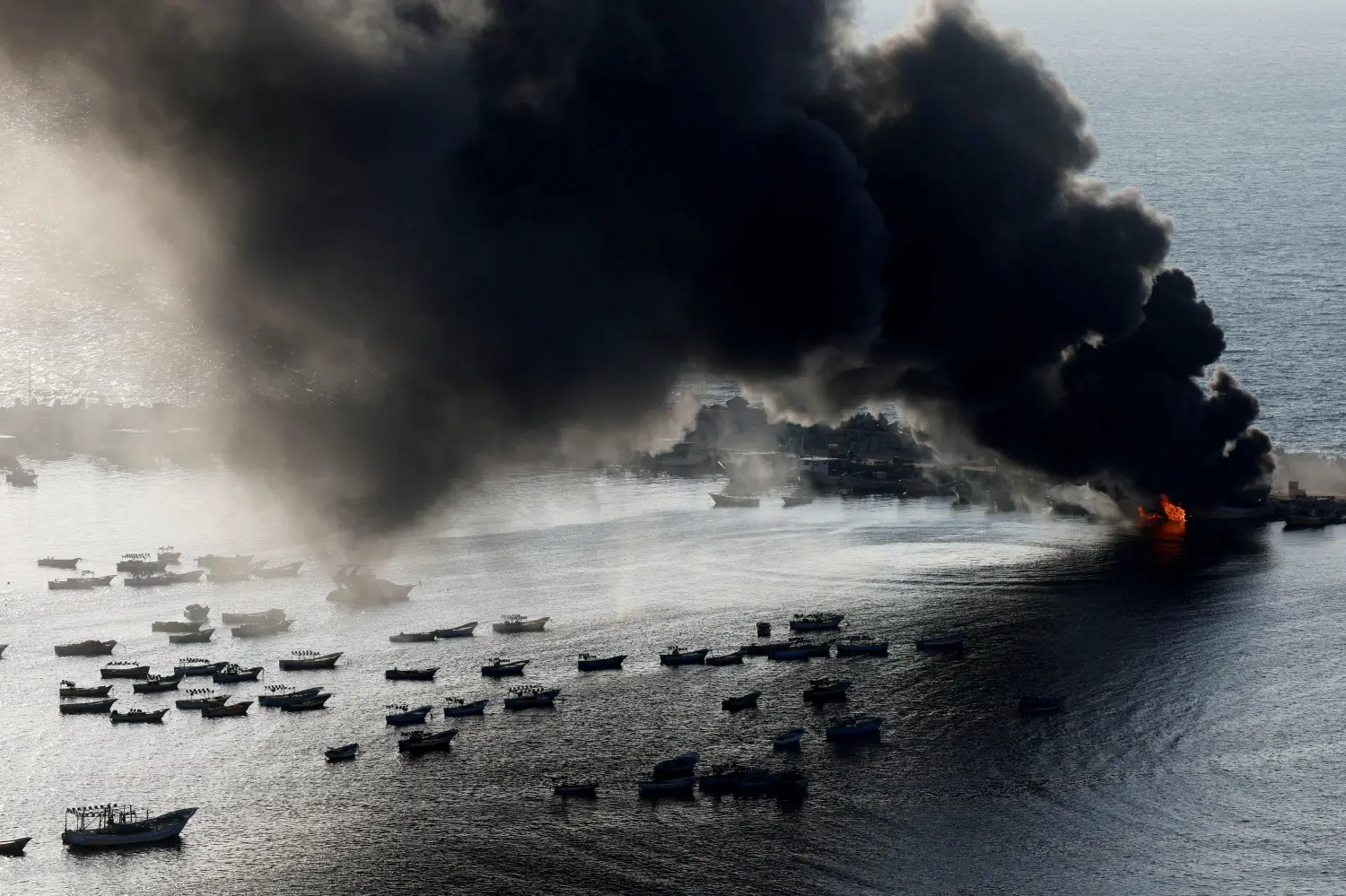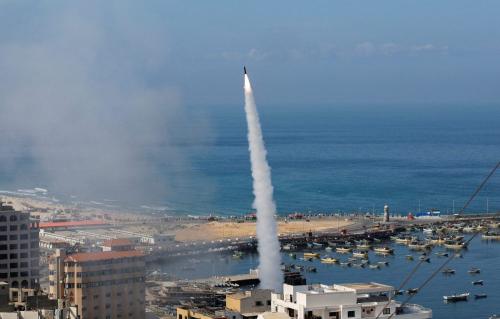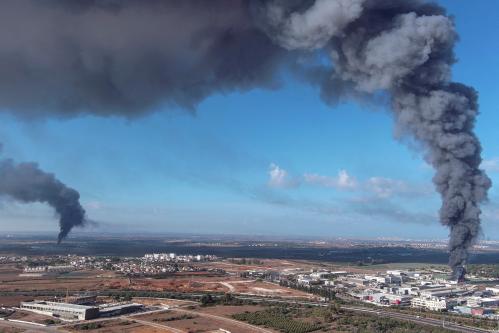In the wake of the atrocities and war this week in Israel and the Gaza Strip, Brookings Foreign Policy scholars weigh in on the ongoing crisis, offering remarks on different angles of the crisis and the policy questions going forward.
Jeffrey Feltman
The failure to anticipate Hamas’ deadly infiltration on October 7 mirrors Israel’s shock at the 1973 Syrian-Egyptian joint attack 50 years ago. However, for all the horrors inflicted on the Israeli communities close to Gaza, unlike in 1973, Israel does not face an immediate existential threat from Hamas. Posing far greater danger are the 150,000 rockets and missiles that Hezbollah has stockpiled in Lebanon. With Hezbollah and Hamas both on the side of Iran’s “axis of resistance,” will Hezbollah open a second front?
As of this writing, since Hamas’ attacks, Hezbollah has fired guided rockets and artillery shells at Israeli positions in Shebaa Farms (Har Dov), occupied by Israel since the 1967 war and claimed by Hezbollah to be Lebanese territory. The Israel Defense Forces (IDF) have responded in kind. While both sides have reported casualties, the numbers, for now, remain low.
By concentrating on low-risk targets, Hezbollah appears to be calculating that it can demonstrate its “resistance” credentials without triggering an all-out war. The IDF seems to be reciprocating. Preserving Hezbollah’s arsenal makes sense for Iran, too, given that Hezbollah is Iran’s deterrence to Israeli threats. Why waste the asset to show solidarity with Hamas, the mullahs might be thinking. Yet there’s a risk: If Israel appears to be on the cusp of destroying Hamas, would Iran consider that of such existential concern to its “axis of resistance” to nudge Hezbollah toward war?
The more significant risk is miscalculation. In 2006, Hezbollah misread Israeli red lines, wrongly assuming that abducting Israeli soldiers from sovereign Israeli territory would not trigger the all-out war that followed. Now, Israel is already at war in Gaza, and Hezbollah’s arsenal is far larger and more sophisticated than in 2006. Miscalculation today would be more devastating to both Israel and Lebanon. Moreover, if an Iranian “smoking gun” reveals Iran was directly involved in the planning and execution of Hamas’ attacks, we should not expect the current Israeli-Lebanese tensions — dangerous but probably manageable — to persist but to escalate.
Sharan Grewal
Hamas’ brutal, surprise attack killing 1,300 has shocked Israel and prompted comparisons with both 9/11 and the 1973 war. After retaliating with air strikes into Gaza that have already killed 1,400, Israel now appears to be preparing a ground invasion, with Israeli Prime Minister Benjamin Netanyahu warning that every Hamas member is “a dead man” and his new unity government partner Benny Gantz vowing to “wipe this thing called Hamas off the face of the Earth.”
The strategic logic of terrorism tells us that groups like Hamas attempt to goad the stronger state into overreaching. The United States, after two decades of failed wars, knows this better than most, and today must restrain its ally from falling into the same trap. A ground invasion, or worse, a return to direct occupation of Gaza, will result in untold suffering that will further catalyze anti-Israeli sentiment in Palestine and beyond. Even if Hamas is somehow destroyed, this sentiment guarantees that another group will take its place. Meanwhile, Defense Minister Yoav Gallant’s dehumanizing language of fighting “animals” and his advocacy for the war crime of cutting off basic necessities risk international sympathy and support.
Hamas’ attack was unprecedented, and the “rules of the game” are now in flux. The easy path is to return to business as usual and continue the cycle of violence. The difficult path is thinking outside the box for a long-term solution for peace. What is needed today is not more death and destruction but rather a bold, magnanimous gesture of outreach to the Palestinians, comparable to Egyptian President Anwar Sadat’s 1977 visit to the Knesset.
Michael E. O’Hanlon
In thinking through what an Israeli siege of Gaza might look like, I am struck by the historical parallel of Israel’s incursion into Lebanon some 17 years ago, as I wrote about earlier this year in my book “Military History for the Modern Strategist.” The topography in highly urbanized Gaza is different, but I nonetheless expect many similarities to what happened in Lebanon.
In 2006, after Hezbollah kidnapped two Israeli soldiers in a cross-border raid, Israel undertook retaliatory airstrikes, especially against Hezbollah’s large missile launchers. When Hezbollah responded with 122-mm Katyusha rocket fire, however, Israel had a harder time targeting the launch sites, and so the conflict expanded. Israel then launched a monthlong ground operation to establish a zone of control in southern Lebanon.
Hezbollah fought back hard against Israeli troops, benefiting from well-prepared firing positions, just as will be the case with Hamas in Gaza. Hezbollah used overlapping fields of fire as well as minefields and other obstacles, and well-camouflaged ambush sites. Tactically, Hezbollah’s discipline and competence were often good, even if Israel got the better of the fight in terms of casualties (700 dead Hezbollah fighters to some 100 for Israel). But Israel failed to displace Hezbollah, as an ensuing United Nations-brokered ceasefire left Hezbollah effectively in control of southern Lebanon.
Yet Israel did succeed in “reestablishing deterrence,” to put it crudely, showing its resolve and taking as well as inflicting enough pain so that no party would lightly consider resuming the same kind of fight again — at least until this month. We will have to watch what Hezbollah does next in the current crisis. If Israel cannot topple or destroy Hamas in this operation, that idea of reestablishing deterrence may have to be part of its set of objectives in this case as well.
Patricia M. Kim
China has issued a characteristically muted reaction to the terrorist attacks in Israel and has not condemned Hamas by name. Despite facing pressure from Israel and U.S. Senate Majority Leader Chuck Schumer, among others, Beijing has only gone so far as to say that it is “deeply saddened by the civilian casualties” and that it “condemns acts that harm civilians” while calling on Palestine and Israel to embrace a two-state solution “at an early date.”
China’s special envoy for Middle East affairs, Zhai Jun, has held calls with his Palestinian, Israeli, and Egyptian counterparts and the readouts of all three meetings largely reiterate Beijing’s official position. Chinese President Xi Jinping has yet to publicly comment on the conflict. While it remains to be seen what additional statements or steps, if any, Beijing may issue in the coming days, it is unlikely for Chinese leaders to explicitly denounce Hamas or to significantly deepen their involvement in the ongoing conflict to avoid jeopardizing ties with the Arab world and key partners like Iran.
Beijing has long prided itself in its ability to talk to “all sides” in the Middle East. It has sought to brand itself as a “neutral” player and peace broker in the region while painting the United States as a biased, hegemonic power whose policies have brought chaos to the Middle East. Notably, Chinese officials have refrained from criticizing the United States in such terms in recent days, likely to avoid rocking the boat with Washington in the lead-up to a potential meeting between Xi and President Joe Biden next month. But Chinese commentators and media have not shied away from accusing the United States of “stoking the fire” and criticizing Washington’s “one-sided” support to Israel.
Tanvi Madan
New Delhi’s reaction came swiftly, with Prime Minister Narendra Modi expressing shock about the “terrorist attacks” and “solidarity with Israel.” He also conveyed to Israeli Prime Minister Benjamin Netanyahu that India “unequivocally condemns terrorism.” Unlike many other countries, there was no attempt to strike a balance. Former Indian National Security Adviser Shivshankar Menon concurred with this approach, stating “you can’t equate both sides when one side is a victim and the other is the attacker.”
India’s response, different from much of the Global South or even past Indian practice, stems from the close India-Israel partnership, Modi’s more open support for Israel, and India’s own experience tackling terrorism — including the Mumbai attacks 15 years ago, when the Chabad House in the city was among the targets.
New Delhi has now also reiterated its support for a two-state solution — Modi was indeed the first Indian premier to go not just to Tel Aviv but separately to Ramallah — and highlighted the “universal obligation to observe international humanitarian law.” But it will likely stress that there’s no justification for terrorism, and refrain from public calls for Israeli restraint.
Nonetheless, Delhi will worry — and seek to consult with its close partners — about crisis escalation and regional spillover, and their adverse impact on India’s interests. Its concerns will include:
- the safety of 18,000-plus citizens in Israel.
- instability in the Middle East, home to 9 million Indian citizens and the source of investment and the majority of Indian oil and liquified natural gas imports.
- damage to, if not demise of, New Delhi’s attempt to de-hyphenate its Israel and Palestine policies.
- impact on the potential Saudi-Israeli deal and the Abraham Accords that were enabling initiatives like I2U2 and the India-Middle East-Europe Economic Corridor.
- the effect on burgeoning India-Egypt ties.
- additional complication in India-Iran ties.
- potential impact on Washington’s Indo-Pacific and China policies.
Suzanne Maloney
Iran’s Foreign Minister Hossein Amir-Abdollahian arrived in Beirut yesterday, where he was met by representatives of Tehran’s long-time Lebanese militia ally, Hezbollah, as well as Hamas and Palestine Islamic Jihad — the two organizations responsible for the horrific October 7 attack in Israel. Surrounded by terrorist proxies, Amir-Abdollahian promised a response from the “axis of resistance” to Israel’s bombardment of Gaza and threatened to open up a second front. It was an audacious Iranian move, intended to lionize its vicious proxies, assume the mantle of protector of the Palestinians, pour salt in the wounds of grieving Israelis, and show contempt to Washington, which has dispatched the Gerald R. Ford aircraft carrier battle group to the Eastern Mediterranean.
Tehran has thrown down the gauntlet. The Biden administration’s efforts to persuade Iran to de-escalate its nuclear and regional provocations failed dismally. The White House now must craft a new approach to Iran that credibly restores deterrence even as it continues to lead the West in supporting Ukraine’s defense and meeting the challenges posed by China to the international order.
This will require a much more serious effort to cripple Iran’s transnational terror network, resume enforcing economic sanctions on Iran, and demonstrate readiness to preempt or respond to Iranian provocations. And central to any success is the need to overcome the political turmoil and institutional dysfunction that has debilitated U.S. foreign policy and emboldened opportunistic adversaries such as Iran and Hamas. The most important step that Washington can take in response to the heinous attacks in Israel is to meet this difficult moment and ensure we provide our partners in both Israel and Ukraine with what both governments need to prevail against the existential threats they are facing.
Amy J. Nelson
Despite warnings as well as lessons learned from the current conflict in Ukraine that emerging technologies, like increasingly capable sensors and ubiquitous drones, would make the element of surprise in wartime impossible, Hamas achieved a complete tactical surprise in an attack that is being compared to 9/11.
While much has been made of the intelligence failures leading to the attack, less has been made of the techno-logistical ones. Not only does Israel have a vast surveillance network, replete with electronic intercepts, sensors, and spies, but it has a military second to none that is equipped with the most advanced technologies, renowned for not only its drones, satellites, missile defenses, and cyber capabilities, but also innovation-fueled efficiency and a technology-driven economy to support it all. Hamas’s rough and ready tactics rendered Israel’s technological advantage non-existent.
While Hamas used rockets likely procured from Iran, it also relied on cheap drones, some equipped with grenades, as well as home-rigged UAVs, to disable Israeli surveillance systems and communications, and attack soldiers near the border. Hamas even used drones to disable at least one of Israel’s highly advanced Merkava Mark IV tanks, whose advanced protection system is engineered to protect it from anti-tank missiles — not drones. All told, Hamas used small, relatively cheap, home-rigged, low-tech, and commercially available technologies to overwhelm systems worth millions.
Hamas’ capable use of technology — low tech though it was — to outrun its high-tech target teaches a lesson about overconfidence in the role of high-tech in the technology-security nexus: Tactics and foresight count all the more.
Bruce Riedel
Jordan is the canary in the coal mine in the new Middle East. Massive demonstrations have taken place in Amman since the Israel-Hamas war erupted last Saturday. Eighty percent of Jordan’s population are Palestinian descendants. The Muslim Brotherhood is very strong and active. In the large refugee camps, Hamas has been celebrated for attacking Israel.
The peace treaty with Israel is extremely unpopular. The most immediate question is whether to continue to have diplomatic relations with Israel. King Abdullah II will face growing pressure to cut ties with Israel. There is little risk of actual conflict; Jordanians are not interested in another war.
But cutting diplomatic relations with Israel will endanger congressional support for U.S. aid to Jordan. After Israel and Egypt, Jordan is the third-largest recipient of American assistance in the world (not counting Ukraine). A halt to U.S. assistance would crash the economy. Abdullah is well aware of this fact, but he cannot ignore popular opinion, especially given the split in the royal family over former Crown Prince Hamzah. The king has resisted pressure to cut ties before, but this crisis is unprecedented in its scope and intensity and will become even more acute if Israel makes a large ground incursion into Gaza that produces significant damage and casualties.
If the war escalates to a major ground conflict in Gaza with lots of civilian casualties, tensions in Jordan will rise.
U.S. President Joe Biden is well aware of the situation. Dispatching Secretary of State Antony Blinken to Amman to consult with the Jordanian authorities is smart. But the street is not listening to Washington.
Natan Sachs
The October 7 Hamas massacre of over 1,300 Israelis, most of them civilians of all ages, was the bloodiest day in Israel’s history, indeed in Jewish history, since the Holocaust. It is already a national trauma: a personal trauma in a tight-knit country, and a collective, unsettling sense of insecurity.
This moment has conflicting effects on Israel. It unites the country in a time of war, with Israelis volunteering in droves to help, offer shelter, and enlist for the brutal fight, much of it still to come. Yet it also heightened an already-deep crisis of faith, for many, in Benjamin Netanyahu’s government. After an odd delay, Netanyahu has finally formed an emergency war cabinet of three, bringing in Benny Gantz, former defense minister and chief of staff of the military, and excluding, crucially, the extremist ministers Bezalel Smotrich and Itamar Ben-Gvir.
Another man also stepped into this leadership void in Israeli eyes: Joe Biden, who won instant and wall-to-wall admiration in Israel for his speech on October 11. His obvious empathy, solidarity, and moral clarity in the face of heinous terrorism were coupled with a clear and visible deterrent to Israel’s other main foe, Lebanese Hezbollah. Sending the Gerald. R. Ford aircraft carrier battle group to the Eastern Mediterranean was coupled with a warning: “to any country, any organization, anyone thinking of taking advantage of this situation, I have one word: Don’t. Don’t.” Hezbollah would do well to heed his warning.
Natalie Sambhi
Southeast Asia’s leaders have condemned the intensifying violence in Israel and Gaza, especially toward civilians. Yet official and popular sentiments through the region have ranged from support for Israel to solidarity with Palestine. In Indonesia, the region’s largest country, support has favored the Palestinian side.
Without naming Hamas, President Joko Widodo (Jokowi) called for an immediate cessation of violence and bloodshed. However, both the president and the Foreign Ministry have stated that “the root of the conflict” is “the occupation of the Palestinian territories by Israel” and “must be resolved, in accordance with the parameters agreed upon by the UN.”
Palestine holds a special place in Indonesia’s history and worldview. Guided by the constitutional spirit of abolishing colonialism, Indonesia’s leaders openly support the Palestinian cause, deeming Israel the occupying force in the West Bank and Gaza Strip. Jakarta maintains working relations with Israel in niche areas but, unlike several Muslim-majority nations of late, the country currently shows no intentions to recognize the state and establish diplomatic ties. Indonesia is headed into an election year and it’s doubtful whether the president would want to spend political capital on Israel in his last four months, especially in the wake of these attacks.
These pro-Palestinian sentiments are echoed in neighboring Malaysia, which also has a Muslim-majority population. Deputy Prime Minister Ahmad Zahid Hamidi has accused the international community, particularly Western states, of hypocrisy in rushing to Ukraine’s aid but ignoring the Palestinian cause.
While these views are not new, their expression is a reminder of how the sentiments of some states in the Global South are shaped by history and postcolonial solidarity. This is pertinent to understanding how the views of rising powers like Indonesia might play out in international diplomacy today.
Jaganath Sankaran
In its brutal terror attack on Israel, Hamas and Islamic Jihad may have fired more than 2,000 rocket barrages into southern and central Israel on the first day of hostilities. Hamas claims to have fired close to 5,000 rockets at Israel. Most of these rockets are crude projectiles designed to saturate Israel’s air space and incite panic. A majority of these rockets do not hit populated areas. However, the sheer number of rockets may have overwhelmed Israel’s Iron Dome missile defense — designed to intercept short-range projectiles — to the extent that some of the rockets were able to strike important civilian targets including hospitals. However, the Iron Dome system appears to have done what it is designed to do, i.e., protect the vast majority of Israeli civilians from a massive and sustained barrage of rockets. Until now, Hamas rockets’ seem to be primarily a diversionary tool aiming to distract and complicate the Israeli military response.
The more worrisome prospect is the possible involvement of Hezbollah in the war. After the 2006 Second Lebanon War, Hezbollah built an arsenal of more than 150,000 rockets and guided missiles. A large-scale Hezbollah strike would be devastating. An October 2021 Israeli war exercise simulated a war with Hezbollah involving massive rocket and precision missile barrages, including direct targeted hits on toxic chemical storage facilities within Israel, while facing violence in Arab-Jewish neighborhoods. The exercise suggested that such a war with Hezbollah would be immensely damaging and overwhelm the capacity of Israeli emergency responders, hospitals, and civil defenses. The chief goal of American and Israeli diplomacy must now be to avert the involvement of Hezbollah and a costly expansion of the conflict.
Caitlin Talmadge
There is much we still don’t know about Hamas’ brutal strike, but its military success appears to have been a function of both its own tactical and operational prowess and mistakes by the Israelis. Despite intense Israeli surveillance, Hamas’ attacks were well planned, tightly coordinated, and innovative, linking together drones, explosives, bulldozers, trucks, infantry, small arms, rockets, and even hang gliders to assault Israel at dozens of points simultaneously. Israel appears to have had too much confidence in its high-tech security wall, which Hamas disabled and penetrated before the Israelis even realized the scale of the attack. And Israel’s concentration of forces away from the Gaza border to the West Bank further slowed its response. All in all, Saturday’s events seem to have resulted from both the over-performance of a conventionally weak militant group and the under-performance of a conventionally strong military — a reminder that material capability alone is often not decisive in conflicts.
Going forward, questions of escalation loom large, both in terms of the level of violence in Israel’s response and in terms of whether the conflict will spread to other fronts or draw in additional actors. Israel could very well pursue total regime change in Gaza, which will entail high casualties on both sides and major long-term strategic and political consequences. Whether or not Iran played a direct role in the initial assault, the possibility of Iran now stoking the fires through its proxy Hezbollah on Israel’s northern border should also not be ruled out. The hostages remain a wild card. If Hamas fulfills its threats to execute them, it could provoke even more devastating Israeli retaliation; but if Israel is desperate to get them back, it might proceed with more restraint and be more willing to negotiate some sort of back-channel de-escalation to ensure their release.
Andrew Yeo
Hamas’ brazen attack against Israel has carried ripple effects as far away as the Korean Peninsula.
Like the border separating Gaza and Israel, the demilitarized zone (DMZ) dividing North and South Korea since 1953 remains one of the most heavily fortified borders in the world. And just as Hamas has dug tunnels to infiltrate into Israel in the past, North Korea has dug at least four known tunnels under the DMZ into South Korea. Hamas’ ability to penetrate the territory of a much more militarily capable adversary has led South Korea’s new defense minister, Shin Won-sik, to double down on calls to suspend the Comprehensive Military Agreement (CMA) agreed by the two Koreas under the previous Moon Jae-in government in 2018. Under the CMA, the two Koreas agreed to establish maritime and aerial buffer zones, ban live-fire drills, and partially withdraw guard posts at the border to reduce inter-Korea tensions.
Shin has criticized the CMA’s no-fly zones over parts of the inter-Korean border, arguing that it restricts South Korea’s ability to fully exercise its air surveillance capabilities to monitor North Korean threats along the DMZ. The incursion of five North Korean drones in January 2023 inside restricted airspace around the presidential office in Seoul rattled the Yoon Suk Yeol government. Hamas’ unprecedented attack against Israel may give the Yoon government the political window it needs to roll back the CMA as South Koreans think about their own border security situation amidst ongoing tensions with North Korea.
The Brookings Institution is committed to quality, independence, and impact.
We are supported by a diverse array of funders. In line with our values and policies, each Brookings publication represents the sole views of its author(s).




















Commentary
The Israel-Gaza crisis
Brookings experts weigh in
October 13, 2023